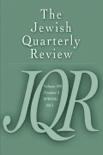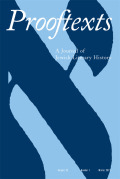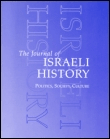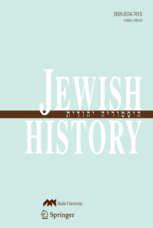
Kwartalnik Historii Zydow-Jewish History Quarterly
Scope & Guideline
Illuminating Jewish Narratives Through Time
Introduction
Aims and Scopes
- Historical Analysis of Jewish Communities:
The journal focuses extensively on the historical development of Jewish communities in Poland and Central Europe, examining their social, cultural, and political dynamics through various historical periods. - Interdisciplinary Approaches:
It employs interdisciplinary methodologies, integrating perspectives from history, sociology, literature, and legal studies to provide a comprehensive understanding of Jewish history. - Focus on Legal and Political Contexts:
There is a consistent emphasis on the legal and political situations affecting Jewish populations, particularly in Poland, highlighting the impact of legislation and governance on Jewish life. - Cultural Representations and Memory:
The journal also delves into cultural representations of Jewish life and memory, exploring how these narratives shape contemporary understanding of Jewish identity and history. - Research on Jewish Thought and Philosophy:
Another core area includes the study of Jewish thought, philosophy, and literature, particularly in the context of historical movements and figures.
Trending and Emerging
- Jewish Women's Experiences and Activism:
There has been a significant increase in research on Jewish women's roles in historical and contemporary contexts, highlighting their activism, experiences during the Holocaust, and contributions to Jewish culture. - Legal Frameworks and Human Rights:
Emerging discussions around the legal status of Jews, particularly in Poland, and how historical jurisprudence has shaped contemporary human rights discourse are becoming more prominent. - Cultural Memory and Representation:
The examination of cultural memory, particularly in the context of the Holocaust and Jewish resistance, is gaining importance, as scholars explore how these narratives influence modern Jewish identity. - Intersections of Jewish and Polish Histories:
An increasing trend is the exploration of the intersections between Jewish and Polish histories, reflecting a more nuanced understanding of shared histories and cultural exchanges. - Jewish Diaspora and Migration Studies:
Research focused on the Jewish diaspora, particularly migration patterns and their cultural impacts, is emerging as a significant area of interest, reflecting global trends and contemporary issues.
Declining or Waning
- Studies on Jewish Organized Crime:
Research focusing on Jewish organized crime in Poland, which was more prevalent in earlier issues, appears to be declining as scholars may be shifting their attention to more pressing contemporary issues or broader historical narratives. - Traditional Religious Practices:
There has been a noticeable decrease in papers discussing traditional religious practices and their evolution over time, possibly as the journal's focus moves towards more secular and sociopolitical aspects of Jewish life. - Regional Studies outside Central Europe:
There seems to be a waning interest in studies related to Jewish communities outside of Central Europe, particularly those in more distant regions, as the journal increasingly concentrates on Polish-Jewish interactions.
Similar Journals

JEWISH QUARTERLY REVIEW
Navigating the Complexities of Jewish History and CultureJewish Quarterly Review, published by University of Pennsylvania Press, is a distinguished academic journal that delves into the multifaceted realms of Jewish culture, history, and religious studies. With a rich publication history dating back to 1953 and an impressive track record of rigorous scholarship, this journal maintains a Q2 ranking in key categories such as Cultural Studies, History, and Religious Studies in 2023, placing it among the top-tier journals in its field. The ISSN number 0021-6682 and the E-ISSN 1553-0604 ensure that its scholarship is widely accessible and traceable in academic databases. While the journal is not open access, it remains an essential resource for researchers, professionals, and students seeking in-depth analysis and perspectives on Jewish thought and heritage. The JQR is known for its editorial commitment to enhancing understanding and dialogue across cultural and historical contexts, making it an invaluable asset for anyone engaged in Jewish studies and related disciplines. With its headquarters in Philadelphia, PA, the journal continues to foster scholarly engagement and critical discourse on Jewish identity and experience through its carefully curated articles and reviews.

Nordisk Judaistik-Scandinavian Jewish Studies
Cultivating Knowledge on Jewish Practices across the Nordic LandsNordisk Judaistik-Scandinavian Jewish Studies is a distinguished academic journal dedicated to the exploration of Jewish culture, history, and religious practices in the Scandinavian context. Published by the DONNER INSTITUTE FOR RESEARCH ON RELIGIOUS AND CULTURAL HISTORY in Finland, this journal has been an open access platform since 2016, allowing easy dissemination of knowledge and fostering scholarly communication among researchers, educators, and students. With a variety of subjects encompassing Anthropology, Cultural Studies, History, and Religious Studies, the journal has achieved commendable recognition, with its latest rankings placing it in Q2 in several categories according to the 2023 Scopus rankings. The journal's significant contribution to the field is evident through its impact, evidenced by its strategic position within its respective quartiles. By bridging interdisciplinary methodologies and Jewish studies within a Scandinavian framework, Nordisk Judaistik serves as an essential resource for those engaged in the complexities and nuances of Jewish heritage and identity in the region.

Judaica Bohemiae
Exploring the Rich Tapestry of Jewish Heritage in Central EuropeJudaica Bohemiae, published by the Zidovske Muzeum Praze, is a prominent scholarly journal dedicated to the study of Jewish culture, history, and religious practices, with a particular focus on the Czech Republic and Central Europe. Since its relaunch in 2007, the journal has established itself as a valuable resource in the fields of Cultural Studies, History, and Religious Studies, achieving a commendable Q2 ranking across these disciplines in 2023. With its thoughtful compilation of research articles and critical essays, Judaica Bohemiae offers insights into the evolving dynamics of Jewish existence and identity. Although it does not currently operate under an open access model, the journal ensures that its high-quality content remains accessible to researchers, professionals, and students interested in the nuanced intersections of culture and history. By promoting rigorous academic discourse and advancing the understanding of Jewish heritage, Judaica Bohemiae continues to play a crucial role in its field, fostering scholarly connections and illuminating the past for future generations.

Zutot
Fostering Critical Conversations Across DisciplinesZutot is a distinguished academic journal published by BRILL, focusing on the multifaceted realms of Arts and Humanities, Cultural Studies, and Religious Studies. With ISSN 1571-7283 and E-ISSN 1875-0214, Zutot presents an invaluable platform for scholars seeking to explore innovative ideas and interdisciplinary approaches within these fields. Recognized within the Q4 category for its contributions to contemporary discourse, the journal ranks at the 44th percentile in Religious Studies and the 39th percentile in General Arts and Humanities, underscoring its relevance and the quality of research it publishes. Since its inception, Zutot has continued to facilitate critical dialogue and scholarship, thus acting as a crucial resource for researchers, professionals, and students alike. Its converged publication years from 2001 to 2004 and 2008 to 2024 further demonstrate its ongoing commitment to supporting rigorous academic inquiry.

NEW GERMAN CRITIQUE
Advancing Innovative Perspectives on German CultureNEW GERMAN CRITIQUE is a prominent academic journal published by Duke University Press, focusing on the dynamic intersections of German studies, cultural theory, and social thought. With its ISSN 0094-033X and E-ISSN 1558-1462, this journal facilitates a critical dialogue within the Arts and Humanities and Cultural Studies fields. As a Q3-ranked journal in both categories as of 2023, it represents a significant platform for scholars exploring contemporary issues through a German lens, addressing themes of identity, memory, and cultural politics. Although NEW GERMAN CRITIQUE is not an open-access journal, it remains a crucial resource for researchers, professionals, and students interested in the evolving landscape of cultural studies, inviting contributions that foster innovative perspectives and facilitate intellectual exchange. Founded in 1988 and continuing its vital discourse into 2024, the journal is headquartered in Durham, North Carolina, and serves as a touchstone for those engaged in the complexities of modern German culture and its global implications.

PROOFTEXTS-A JOURNAL OF JEWISH LITERARY HISTORY
Fostering Dialogue on Jewish Literary EvolutionPROOFTEXTS: A Journal of Jewish Literary History, published by Indiana University Press, is a premier academic journal dedicated to the exploration and critical analysis of Jewish literature and its historical contexts. With an ISSN of 0272-9601 and an E-ISSN of 1086-3311, this journal not only serves as a platform for innovative scholarship but also aims to foster dialogue among scholars in the fields of Cultural Studies, Literature and Literary Theory, and Religious Studies. As evidenced by its 2023 Scopus ranking—place within the third quartile in Cultural Studies and Religious Studies, and second quartile in Literature and Literary Theory—PROOFTEXTS stands out as a significant contributor to academic literature, attracting a diverse readership of researchers, professionals, and students alike. The journal’s commitment to open access is limited, thus ensuring a selective dissemination of high-quality research materials. Researchers are encouraged to contribute their insights and engage with the intricate narratives that shape Jewish literary heritage from 2002 to its convergence during select years, highlighting the ongoing evolution and relevance of this vibrant field. For in-depth understanding of Jewish literary history, PROOFTEXTS remains an indispensable resource.

Journal of Israeli History
Delving into the Diverse Chronicles of IsraelThe Journal of Israeli History, published by Routledge Journals, Taylor & Francis Ltd, is a distinguished platform dedicated to the exploration of the diverse and dynamic history of Israel. With an ISSN of 1353-1042 and an E-ISSN of 1744-0548, this journal has made significant contributions to the field since its inception, bridging cultural studies and political science. Recognized in 2023 with prestigious rankings such as Q1 in History and Q2 in Cultural Studies, the journal offers valuable insights and innovative scholarly work relevant to both historical interpretations and contemporary analyses. Although it does not offer Open Access, the journal is a critical resource for researchers, professionals, and students seeking to deepen their understanding of Israeli history, society, and politics. Situated in the UK at 2-4 Park Square, Milton Park, Abingdon OX14 4RN, Oxon, England, it continues to engage with historical narratives from 1994 through 2024, fostering a rich academic dialogue around the historical complexities of the region.

Images
Exploring the Intersections of Visual Culture and SocietyImages, published by BRILL, serves as a significant academic platform within the realms of Cultural Studies, History, Religious Studies, and the Visual Arts and Performing Arts. With its ISSN 1871-7993 and E-ISSN 1871-8000, this journal is committed to providing a scholarly forum that engages with the complexities of visual representations and their impact on cultural narratives. Though it currently holds a Q4 category ranking across various fields, indicating room for growth, its presence in Scopus rankings showcases its contribution to the arts and humanities, positioning it as a unique voice in interdisciplinary discourse. The journal aims to publish innovative research that fosters dialogue among scholars, practitioners, and students interested in the intersections of visual culture and societal dynamics. Despite its non-open access status, Images remains a vital resource for those seeking to understand the intricate fabric of cultural expressions from historical and contemporary perspectives, offering insights that resonate across academic and artistic landscapes.

Jewish History
Connecting Communities Through Historical InsightsJewish History is a significant academic journal published by Springer, focusing on the multifaceted historical narratives of Jewish communities worldwide. With roots tracing back to 1986, this esteemed journal offers an intellectual platform where researchers and scholars can engage critically with the vast and rich tapestry of Jewish heritage, culture, and experiences. Although it operates under a traditional subscription model, the journal has gained a notable standing in recent years, achieving a Q4 ranking in Cultural Studies and a Q3 ranking in History for 2023, reflecting its robust scholarly contributions. The journal is indexed in Scopus, with a rank of #808 in Arts and Humanities History and #754 in Social Sciences Cultural Studies, placing it within the competitive landscape of academic publishing. Its commitment to advancing the field of Jewish studies makes it an essential resource for researchers, professionals, and students alike, who seek to deepen their understanding of Jewish history from historical, cultural, and social perspectives.

Holocaust-Studii si Cercetari
Illuminating the Shadows of the Past for a Brighter FutureHolocaust-Studii si Cercetari, published by the Institutul Național pentru Studierea Holocaustului din România "Elie Wiesel", is a vital academic journal dedicated to the study and research of Holocaust history, memory, and its contemporary implications. With its ISSN and E-ISSN both listed as 2065-6602, this journal serves as a significant platform for researchers, educators, and students aiming to deepen their understanding of the Holocaust and its impact on society. Located in Bucharest, Romania, at Bulevardul Dacia, Nr 89, Sector 2, Bucharest 020052, it amplifies discussions surrounding historical events, human rights, and the importance of remembrance, contributing greatly to the scholarly discourse in Holocaust studies. Though currently not designated as open access, this journal remains crucial for those seeking quality peer-reviewed articles in this essential field of study, fostering a richer awareness of the past while informing present and future dialogues.